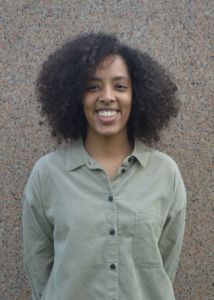Anti-Racism Week coming up: ‘It is important that faculties are really going to change’
-
 A Black Lives Matter-protest in Hamburg, 5 juni 2020. Photo: Rasande Tyskar (via Flickr)
A Black Lives Matter-protest in Hamburg, 5 juni 2020. Photo: Rasande Tyskar (via Flickr)
Radboud University does too little against racism according to a group of students and employees of Radboud University. They are organising an Anti-Racism Awareness Week in the last week of March to raise more awareness.
Nikita Krouwel is willing to talk about her role in the Anti-Racism Awareness Week (ARA), but she wants to know something before the conversation starts. ‘How openly can I tell my story?’ She asks. ‘You sometimes notice resistance in white people when they are confronted with racism, because they feel attacked,’ she explains later.
Krouwel recently noticed that talking about racism safely is not a given for students of colour. When another ARA activist said in an interview that it was sometimes difficult to grow up in a white environment as a black person because he could not always discuss racism, the editor-in-chief of a student association magazine responded as if stung by a wasp. Moreover, he dismissed the student’s experience and left that comment out of the article. Krouwel cannot understand that. ‘In that instance, the editor-in-chief considered his own defensive feeling more important than the other person’s unpleasant racist experience.’

Subtle
Is that safety missing here? Is the university not inclusive? According to Krouwel it could be a lot better. ‘There are often many subtle forms of racism in a white environment such as the university.’ By this she means the collective disadvantage of one group compared to another group. ‘You can imagine, for example, that it is difficult for students of colour to voice their experiences. Or that you miss their perspectives due to the lack of diversity on student boards.’
Krouwel, who is a Transatlantic Studies student herself, is organising an anti-racism week together with a group of students, lecturers and the newly appointed diversity officer, which will take place in the last week of March. You could call it a movement: the aim is to make students and staff more aware of racism at the university, ‘and thus create an inclusive and safe university for everyone,’ she explains.
‘I sometimes experience little support from the board’
Krouwel points to ‘systemic’ racism in society, for example in the labour market. ‘We experience that we sometimes have more difficulty finding a job or internship than white people.’ This has also been revealed by research, for example by this study published by the Monitor Arbeidsdiscriminatie.
Eurocentric perspective
It begs the question whether the university is doing enough to combat racism. Krouwel and many black students do not always feel supported by the Executive Board. ‘I sometimes experience little support from the board. They say university is an inclusive place but do little to make it that way. I find it frustrating.’
Krouwel gives an example. During the Black Lives Matter protests in June, millions of protesters took to the streets worldwide. Nijmegen residents also came out en masse to show that they were against racism. However, Radboud University remained silent for a long time: only a month after the Nijmegen demonstration did the board speak out on the matter. ‘That stings. Some students were terribly upset and had difficulty studying for their exams. It doesn’t help when you don’t experience any support from your university.’
However, a programme manager for diversity, equality and inclusion has been appointed at Radboud University since September. Rona Jualla van Oudenhoven told Vox that she wanted to achieve a ‘safe and inclusive space’ for everyone. Krouwel sees this appointment as step in the right direction. ‘It is important that things at the university’s faculties are really going to change – things like the Eurocentric perspective of some programmes. Too often these are still aimed at Western scientists. In medicine, for example, more attention could be paid to non-Western healing methods.’
Annual tradition
Preparations for the Anti-Racism Awareness Week are now in full swing. ‘As for the agenda,’ reports Krouwel, ‘there will be discussions, lectures and film evenings. We are of course hindered by the coronavirus crisis, but a lot can be done from home. There are also advantages: now, for example, we can invite speakers from America.’ Is the discussion about the name of the Linnaeus building also going to be picked up again? ‘That’s definitely possible,’ she says. ‘The idea is to address all forms of racism like systemic racism or biases.’
Krouwel hopes to make the ARA week an annual tradition. ‘You can see it as an ongoing conversation. We hope it will have an increasing impact over the years.’



